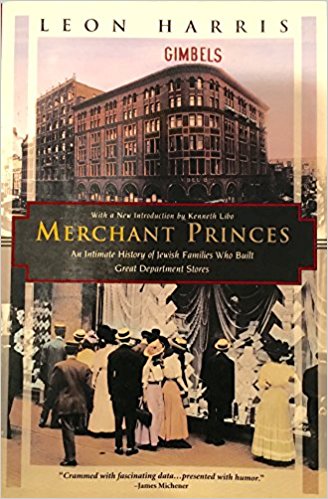Selling and Seduction
Selling and Seduction
While its hard to imagine in this day of mobile phones and deliverymen that try in vain to hide a bland corrugated cardboard box under your doormat, there was a a time when department store retail was new, fresh, unexplored territory that provided wealth and privilege to its owners. In the book Merchant Princes: An Intimate History of Jewish Families Who Built Great Department Stores by Leon Harris, the reader travels back in time before mega malls and look-a-like chain stores to tell the stories of the families that built early retail dynasties.
The best parts of the book are when Harris, an heir of a prominent Dallas retail family, gets into anecdotes about selling. In the introduction, he tells us a story from his own store.
“Recently, after the funeral of one of my former buyers, I was approached by a mourner who had been a sales man in our store’s men’s furnishings department. . .He wanted to reminisce and told me at great length about a Sunday before Christmas in the 1930s – in those days it was not unusual to work on Sunday. In both newspapers there has been a half-page advertisement, he said ‘ one of those really fabulous buys your father used to make – these were regular three-dollar silk neck ties–that was an expensive tie then–and we were offering them at a dollar apiece. To get them at that price, your father had bought two thousand dozen–that’s more than one tie for every adult male in the city–the kind of big buy that used to scare your uncle to death but excited the rest of us.’
“He then spend perhaps half an hour lovingly describing the patterns, weaves, and feel of the various silk ties, remembered clearly from some forty years earlier.
“‘Your father had come down to the store early to make certain we properly assorted and displayed the ties, but when he arrived the ties were not there! No one knew where they were and those two ads had already run. You can imagine the hell that broke loose, frantic phone calls to New York, feverish searching all over the store, the warehouse, the depot. Finally we found them at the express office.
“‘And we sold them all in three days.–twenty-four thousand ties in three days–every last one of those beautiful Cheney silks for just a dollar in just three days.’
“He had a smile on his face and tears in his eyes. ‘It was fun,’ he said. ‘It was such fun.’
“It is perhaps difficult for someone who is not a merchant to understand how much fun it is to buy and sell a lot of something. . .”
I marked up multiple sections of the book but my favorite part is the recollection of a Harry Winston jewelry salesman.
“It was while listening to a top traveling salesman for the jeweler Harry Winston describe his sale of an especially expensive emerald and diamond Riviére to the wife of a banker in a small Texas town that I first became aware of how many very similar the sale of a high-priced luxury item is to seduction–not rape, but mutually satisfactory seduction.
“Slowly, pridefully, relishing the recollection of every detail, he described his flirtation, her flicker of initial interest, his gradually increasing ardor, her gradually diminishing pro forma refusals, and how finally she joyfully, excitedly, ‘opened up, gave up, gave in, and I had her!’
“As I listened, I was struck both by the reciprocal and the ritualistic aspects of the prolonged seduction: ‘She really made me work for it. It took me two hours to get her to say, ‘Yes!” It was as formally choreographed as a balled or Kabuki performance, and performance was an essential of the total experience.
“‘It sounds when you describe it as though you had seduced her,’ I told Winston’s salesman, ‘as though you both had an equally glorious time, furious foreplay leading to climax and mutual satisfaction.’
“‘And the satisfaction is not just momentary, it’s permanent,’ said Winston’s man. But in this last judgement he soon made it evident that he was mistaken, for as I listened to him describing other important sales he had made, it quickly became obvious that in selling he was a psychiatric textbook example of Don Juan–endlessly unsatisfied, permanently priapic. It was precisely this priapism that made his such a great salesman.”
Good stuff.

